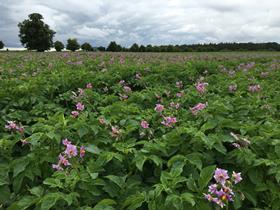
Blackleg and Brexit will be the focus of an AHDB conference for the potato seed industry on 3 November.
Held this year in St Andrews, Scotland, the biennial event will explore measures to control bacterial blight blackleg, levels of which are rising slightly according to the AHDB.
“In the seed potato sector there is a strong awareness that we need to work hard to control disease risks,” said Rob Clayton, sector strategy director at AHDB Potatoes.
“At this year’s event we plan to identify known best practice measures and separate them into those that are widely used and those that remain largely unadopted. Once we have identified those that are not being used, we need to find out what is preventing their uptake.”
Key areas of blackleg research will be highlighted in two workshops on the disease. A study carried out by the James Hutton Institute, jointly funded by AHDB and the Scottish Government, will assess the routes of contamination in high-grade seed.
And a second project – a partnership between Science and Advice for Scottish Agriculture (SASA) and the AHDB – will be presented, investigating social changes and industry practices that could be contributing to a rise in blackleg.
Another issue at the forefront of many minds in the industry is Brexit. Peter Hardwick, head of exports at the AHDB, will outline the potential post-Brexit scenarios and look at the opportunities and threats they present in terms international trade.
He said: 'While the post-Brexit environment is likely to be challenging for all our agricultural sectors, the tremendous progress that has been made in the seed potato industry to develop and build non-EU trade will make it more resilient to a situation which may not include free trade within a single market.'
Additional workshops will cover storage issues such as air leakage, CO2 management and condensation control, as well as consumer trends and developing markets among other topics.



